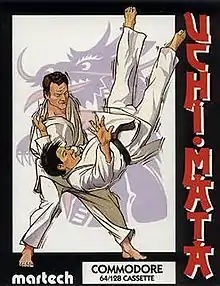Brian Jacks Uchi Mata
Brian Jacks Uchi Mata (or just Uchi Mata) is a judo fighting game released for various home computers, sold on the name of British Olympic judoka Brian Jacks. It's the first fighting game to feature counters and hidden moves.[1]
| Brian Jacks Uchi Mata | |
|---|---|
 | |
| Developer(s) | Andy Walker Paul Hodgson |
| Publisher(s) | Martech |
| Platform(s) | Commodore 64, Amstrad CPC, ZX Spectrum, MSX |
| Release | 1986 |
| Genre(s) | Sports, Fighting |
| Mode(s) | Single-player, multiplayer |
Summary
This computer game is notable for its control scheme that allowed users to perform various fighting techniques.[1]
A similar control scheme would be used a year later in Capcom's arcade game Street Fighter. Another feature that would later appear in Street Fighter was the inclusion of hidden moves: moves that were not included in the instruction manual that players would have to find on their own.[2]
Unlike most other martial arts games the approach is more important than the actual kick/shove/punch etc., since the player must first grab the opponent and subsequently do an up/down/left/right combo (about ten different options to choose from) on the joystick before anything happens. The most powerful move is called uchi mata and if performed correctly it will knock out the opponent no matter how much strength he may have left. A nice little detail here is that the opponent's eyes (really just two black dots, and only one since the game is a side scroller) close/disappear when he lands on his back after a knock out-move, as if to say 'he's gone'. Punching is not allowed, yet there's one available punch in the game, and if executed the player is immediately disqualified.
There are six to seven opponents in each level and you can continue play working your way up the 'Dan' ratings.
Reception
| Publication | Score |
|---|---|
| Crash | 36%[3] |
| CVG | 30/40[4] |
| Sinclair User | 7/10[5] |
| Your Sinclair | 7/10[6] |
| Zzap!64 | 89%[7] |
The game received mixed reviews. The animation was praised by Sinclair User, but Crash criticised the controls. CVG said it was realistic but difficult. Phil South of Your Sinclair said "Uchi Mata is quite good fun, but it seemed a bit unfinished to me. Shame, 'cos with a bit of tickling up this could have been a surefire hit."
References
- Snape, Joel (10 August 2014). "Grappling is one of the oldest sports in the world - so why can't video games do it properly?". Eurogamer. Gamer Network. Retrieved 11 August 2014.
- "Lemon64.com - all about Commodore 64". Lemon64. Retrieved 2020-05-09.
- https://wos.meulie.net/pub/sinclair/magazines/Crash/Issue39/Pages/Crash3900114.jpg
- https://wos.meulie.net/pub/sinclair/magazines/Computer-and-Video-Games/Issue062/Pages/CVG06200022.jpg
- https://wos.meulie.net/pub/sinclair/magazines/SinclairUser/Issue061/Pages/SinclairUser06100028.jpg
- http://www.ysrnry.co.uk/articles/uchimata.htm
- "Zzap! Test". December 1986. p. 21.
